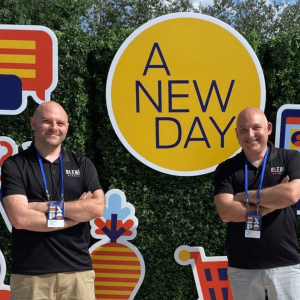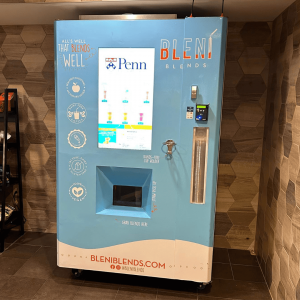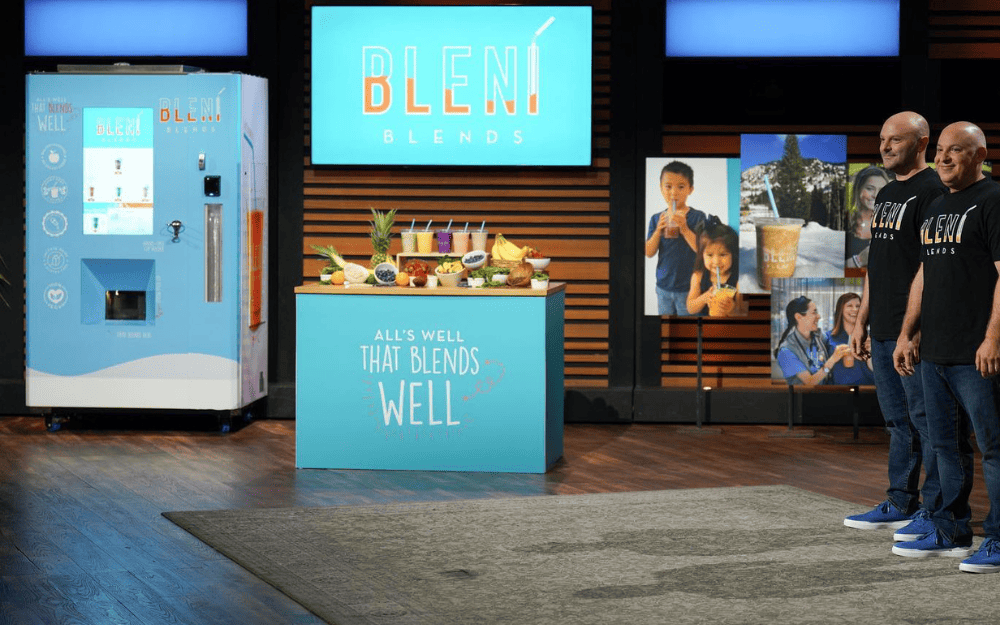Do you have a really short break and need something healthy to drink? Don’t worry, Bleni Blends new automated smoothie kiosks can make you an all natural fruit smoothie, with no added sugar, in just one minute. But what will the Sharks think about this smooth new way to grab a healthy drink on go? Find out more in our Bleni Blends Shark Tank update.
What is Bleni Blends?
Bleni Blends is a company that markets self-serve kiosks which produce real fruit smoothies with no artificial flavors, no preservatives, and no added sugar. The Bleni Blends machines make these healthy smoothies in just one minute. The company is located in Havertown, Pennsylvania.
Bleni Blends places their machines and provides service to specific locations, and they also offer kiosks for sale, for which the company then provides installation and training for the kiosks, along with their proprietary, shelf-stable pouches, which are used by the machine to create healthy fruit smoothies and cold coffee drinks.
Who created Bleni Blends?

Bleni Blends was co-founded by Stuart and Peter Shapiro, two brothers from Philadelphia, Pennsylvania. The brothers had worked together on several projects prior to co-founding Bleni Blends.
Stuart Shapiro is the Vice President for Operations of the company, and he attended college at Tulane University, where he earned a BS degree in Business Administration. Stuart started his professional career at his family law practice, Shapiro Law Office PC, which specialized in creditors’ rights. Stuart then teamed up with his brother to purchase and operate a number of rental properties in the Poconos region of Pennsylvania. Finally, prior to co-founding Bleni Blends, Stuart and Peter also started Robotic Desserts, owner-operator of the Reis & Irvy’s frozen yogurt robot franchise in the Greater Philadelphia area.
Peter Shapiro is the CEO of Bleni Blends, and like his brother, he also attended Tulane and graduated with a BS degree in Business Administration. After graduating, Peter went on to earn an MBA from Temple University. He then started his professional career in academia, as he worked at Tulane as an Assistant Vice President for Undergraduate Admissions. After his stint at the college, Peter returned to Philadelphia and founded Four Seasons Investments, a company which specializes in purchasing and liquidating distressed receivables. While working at his firm, Peter also partnered with Stuart, both in the real estate rental business, and the robotic frozen yogurt company.
How did Bleni Blends get started?
For the company’s founders, Peter and Stuart Shapiro, Bleni Blends originated from the brothers’ experience with another unattended vending concept. While Peter and Stuart were working together in the real estate business, Peter, who was always looking for new business opportunities, stumbled upon the concept of unattended food service retail. He believed that this was a market that hadn’t really been tapped yet, so he spoke with Stuart, and they began to look for entry into the market.
Their first venture into the self-service kiosk business was with Rei’s and Irvy’s Frozen Yogurt, as they entered into a franchise agreement with the frozen yogurt company to operate self-service kiosks throughout the Philadelphia region. As reported in the Philly Voice, Peter said, “We saw it as this huge industry that hasn’t really begun yet. We loved the unattended space, but we didn’t like what went into the frozen yogurt machines. There was a lot of refrigeration needed, freezer space, electrical lines.”
Thus, when Peter discovered Bleni Blends, a kiosk which could make healthy fruit smoothies using shelf-stable ingredients, the brothers were off to Canada to check out a prototype. Within a few weeks of their trip, they had negotiated the exclusive rights for Bleni Blends in the US.
What happened to Bleni Blends before Shark Tank?
At the time Bleni Blends co-founders Stuart and Peter pitched in the Tank, the company had placed 41 of their self-service smoothie kiosks at various locations. They had also just received delivery of an additional 20 machines.
The company was servicing some of the machines on their own, and they had also contracted foodservice companies to service their kiosks as well. In addition to owning and operating the machines in house, Bleni Blends also offered their self-service kiosks for sale at a price of $30k per machine.
The company had been trading for a little over two years when they entered the Tank, and in the previous year, they had $275k in sales. During their pitch, they told the Sharks that their year-to-date revenues were $465k, and they were on track to have $1.5 million in sales for the full year.
Bleni Blends had agreed to purchase a total of 80 machines for the current year, and they had already met this requirement with the machines they had received and those which were on order, awaiting delivery.
With the large amount of capital required to purchase their kiosks, the company likely needed a Shark, both as an investor, and as a means to secure the additional financing which would be required to quickly expand the business.
What do customers think of Bleni Blends?

For the first time in our coverage of Shark Tank products, we were unable to find a single online customer review for Bleni Blends. Surprisingly, there aren’t even any professional reviews of the self-service kiosk-made smoothies available. Not even the company website, nor its Facebook site, displays a single customer review!
Since Bleni Blends is basically a business-to-business enterprise, and most of their machines are currently installed in healthcare facilities, we knew that it might be difficult to find reviews, but with over 70 machines currently online, we had hoped that we would find at least a few. We will certainly continue to watch for online reviews of the company’s product as they expand into new markets, such as universities and fitness centers.
When did Bleni Blends appear on Shark Tank?
Bleni Blends appeared on Shark Tank in Season 14, Episode 18, which aired on March 31st, 2023. The company pitched to regular Sharks Mark Cuban, Lori Greiner, Kevin O’Leary, Daymond John, and recurring Guest Shark Daniel Lubetzky, founder and CEO of KIND Snacks.
Bleni Blends was not the only company to appear on Season 14 of Shark Tank with a new type of machine for making specialty beverages, check out our Nutr Shark Tank update to read about a new way to make healthy nut milks at home.
What happened to Bleni Blends on Shark Tank?
Bleni Blend co-founders Peter and Stuart Shapiro entered the Tank and asked the Sharks for an investment of $250k in return for a 6% equity stake in their company.
Peter started the pitch by telling the Sharks, “Traditionally, if you have only 60 seconds between meetings, or before your shift starts, there is limited time, which can restrict your options to standard vending machines.” Stuart added, “Chips and soda, candy, an energy drink? That won’t keep the Bleni bros running for long.”
Next, Peter told the Sharks that he believed that the future of food was in unattended retail, and he then introduced their new Bleni Blends kiosk, which makes real fruit smoothies, with no artificial flavors, preservatives, or added sugar, and it makes these healthy drinks in just one minute. Stuart then added, “It’s like picking fruit from a tree and blending it yourself.”
The Shapiro brothers also informed the Sharks that the Blendi Blends kiosks can also make cold coffee drinks, and Stuart said that their kiosks were like having an automated smoothie shop in just 12 square feet.
After closing out the pitch with “All’s well that blends well,” the Sharks were invited to sample a number of Bleni Kiosk smoothies and a coffee drink. Sharks Daymond, Daniel, and Lori all quickly commented on how much they liked the drinks. During the tasting, Kevin O’Leary asked the Bleni team if there was added sugar in the smoothies, and he learned that all of the sweetness comes from the fruit.
Guest Shark Danel Lubeztky was ready to get down to business, as he asked if the company produced the fruit, or if they purchased it in the pouches. The Bleni brothers informed Daniel that the pouches contained proprietary blends and that they were shelf stable. Peter explained that the company manufactured the pouches, and they have 3 factories in the US that package their blends.
Daymond John wanted to hear about the Shapiro brothers, their background and how long they had been in the business. Peter explained that he and his brother both had business backgrounds, including owning and operating rental properties together, and one day while out looking at properties, Peter discovered that unattended retail was a whole new world which was still largely untapped.
During this part of the pitch, the Sharks also learned that the Bleni brothers had flown up to Canada to see a prototype of the Bleni kiosk, and within a few weeks, they had negotiated the exclusive rights for the machine in the US. Hearing this, Mark Cuban immediately wanted to know the terms of the agreement, and he learned that they were the exclusive licensee in the US for the term of the patent, 15 years.
Daniel next wanted to know how many machines were in place, and the numbers for the best performing machines. Stuart told Daniel that they had placed 41 kiosks, and the best producers made about $8k per month. Kevin O’Leary then wanted to know if the company had a team to service the machines, and he learned that the company serviced some machines while some large foodservice companies had also been contracted to service some of them. O’Leary discovered that the company also sells the machines, and provides training to the purchaser.
Stuart then informed the Sharks that Bleni owned the supply chain, so all of the machines solely used products produced by the company. Mark Cuban then asked about the retail price, and he discovered that the smoothies cost, on average, $5.25, and to produce, they cost about $1.40, blended.
Daniel then requested the company’s numbers, and he discovered they had been in business for under 2 years, and for their first year, they had revenues of $275k, while for the current year-to-date, they were at $465k, but were projecting sales of $1.5 million for the full year.
Daymond came in to ask how much each machine cost them, and he was surprised to hear that the machines cost $19k each, and if the company sells a machine to a third party, they charge $30k for it. This made Mark Cuban think that the brothers actually manufactured the machines, but he learned that they purchased the machines from the patent owner.
Finally, Mark also learned that with their license, the brothers were required to purchase 80 machines in the current year, and then, 100 and 120 machines in each of the next two years. Stuart also explained that at some point, the company could buy out the patent for $4 million.
After hearing the numbers, it was obvious that at least one Shark was ready to declare his intentions.
Did Bleni Blends get a deal on Shark Tank?
Bleni Blends successfully negotiated a deal on Shark Tank. Lori Greiner and Guest Shark Daniel Lubetzky agreed to invest $250k and to provide a line of credit for an additional $500k in return for a 35% equity stake in the business.
Kevin O’Leary broke the ice on this smoothie deal by telling the Bleni team that he did not like the large capital requirement for the machines; he said that he would be interested if the deal was just for the shelf-stable packages.
With one Shark out, Peter told the Sharks that they had everything in the business, that Stuart sold his house, so they now live together, and they had invested $1.2 million into Bleni Blends. Mark Cuban exclaimed, “You guys are all in!”
Daymond spoke next to say that he didn’t like the fact that the Shapiro brothers had a license for the machines; he thought that this carried too much risk for an investor. Mark Cuban followed Daymond telling the brothers, “Guys, I get pitched self service food service every single day.” He went on to say that there was simply too much risk from potential technological obsolescence.
Lori told the Bleni team that the smoothies were phenomenal, and that she had spoken with Daniel, who had a lot of experience in the industry, so she turned things over to Daniel who told the brothers, “For me, it’s gonna be a very Sharky offer because it’s gonna require a ton of investment from my team to help you, so I would only do this for 35% of the company.” The rest of the Sharks groaned when they heard Daniel and Lori’s offer.
Peter told the Sharks that he realized they were both behemoths, but he countered at 15% equity, to which Daniel responded, “I wouldn’t do it for 34%.” Daniel said again that he knew that this investment would create a great deal of work for his team. After some back and forth, Lori encouraged the guys to talk amongst themselves.
After a brief chat, Stuart again asked Daniel to come down from 35%, but Daniel stayed firm. Kevin O’Leary next jumped in to ask Peter and Stuart if there was any chance of doing a deal at 35%? Peter then asked Daniel if he and Lori would add a $500k line of credit to the deal, and when Daniel said that they could add the line of credit, Peter smiled and said, “The two of you are our dream. You have a deal.”
Bleni Blends Shark Tank update, what happened next?
Unlike some products which have appeared on Shark Tank, the Bleni Blends brothers told Super Entrepreneur Joe Pardo that they did not experience a huge Shark Tank effect after their episode aired. Co-founders Stuart and Peter Shapiro explained to Pardo that because their machines were so expensive, purchase orders for additional machines are made long in advance, and the company has a fairly long timeline to plan the installation of a new machine.
We have been unable to find any evidence that the deal between Bleni Blends and the Shark team of Lori Greiner and Daniel Lubetzky has closed; however, there are signs that the company has continued to make progress. When Bleni pitched in the Tank, the co-founders told the Sharks that they had placed 41 machines in the market, but according to the company website, there are now 73 Bleni Blends kiosks in operation nationally.
During the Joe Pardo interview, the Shapiro brothers also explained that when they first came up with the idea, they had envisioned colleges and universities to be one of their primary markets; however, as they came online in late 2020, with Covid in full swing, many colleges were closed, so they had to pivot to hospitals and medical centers as their primary targets for placing new machines.
At the time of Bleni’s Shark Tank taping, almost all of their kiosks were placed in medical facilities, but the more recent kiosk placements have been at colleges, so it appears that this market is opening up to Bleni’s automated healthy smoothies.
It will be interesting to see what happens with the company if the deal with Daniel and Lori finally closes, as these two Sharks bring to the table a really unique combination of both market knowledge and mass marketing ability.

